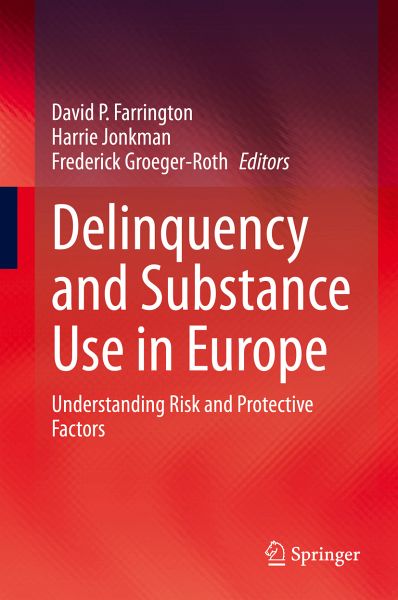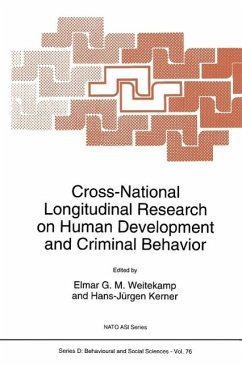
Delinquency and Substance Use in Europe (eBook, PDF)
Understanding Risk and Protective Factors
Redaktion: P. Farrington, David; Groeger-Roth, Frederick; Jonkman, Harrie
Versandkostenfrei!
Sofort per Download lieferbar
72,95 €
inkl. MwSt.
Weitere Ausgaben:

PAYBACK Punkte
36 °P sammeln!
This book examines the use of "Communities That Care" (CTC) interventions in European countries. It reports results obtained by using the CTC Youth Survey in five European countries covering different parts of Europe - Great Britain, the Netherlands, Germany, Croatia, and Cyprus. The main aim of the book is to compare (a) the prevalence of delinquency and substance use, (b) the prevalence of key risk and protective factors, and (c) the strength of relationships between risk and protective factors and delinquency and substance use, in these five European countries. The chapters in this book com...
This book examines the use of "Communities That Care" (CTC) interventions in European countries. It reports results obtained by using the CTC Youth Survey in five European countries covering different parts of Europe - Great Britain, the Netherlands, Germany, Croatia, and Cyprus. The main aim of the book is to compare (a) the prevalence of delinquency and substance use, (b) the prevalence of key risk and protective factors, and (c) the strength of relationships between risk and protective factors and delinquency and substance use, in these five European countries.
The chapters in this book compare similarities and differences between the countries, possible explanations of these, and the implications of the results for theories and for intervention policy and practice. Additionally, it provides evidence about the replicability over time and place of the strength of relationships between (i) risk and protective factors and (ii) delinquency and substance use. In turn, this increases confidence in the generalizability of criminological theories over time and place. It will be of interest to researchers and practitioners in criminology and criminal justice, particularly those with an interest in developmental and life-course criminology, juvenile delinquency, and substance use, as well as crime prevention and intervention.
The chapters in this book compare similarities and differences between the countries, possible explanations of these, and the implications of the results for theories and for intervention policy and practice. Additionally, it provides evidence about the replicability over time and place of the strength of relationships between (i) risk and protective factors and (ii) delinquency and substance use. In turn, this increases confidence in the generalizability of criminological theories over time and place. It will be of interest to researchers and practitioners in criminology and criminal justice, particularly those with an interest in developmental and life-course criminology, juvenile delinquency, and substance use, as well as crime prevention and intervention.
Dieser Download kann aus rechtlichen Gründen nur mit Rechnungsadresse in A, B, BG, CY, CZ, D, DK, EW, E, FIN, F, GR, HR, H, IRL, I, LT, L, LR, M, NL, PL, P, R, S, SLO, SK ausgeliefert werden.












